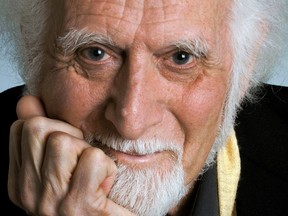Wyman is a proponent of the claim that art is a deeply humanizing and pro-democratic enterprise.

Reviews and recommendations are unbiased and products are independently selected. Postmedia may earn an affiliate commission from purchases made through links on this page.
Article content
The Compassionate Imagination: How the Arts are Fundamental to a Working Democracy
Max Wyman | cormorant books
Article content
$19.95 | 234 pages

The ominous statement, “When I hear the word culture, I reach for my revolver,” is often mistakenly attributed to Adolf Hitler’s henchman Hermann Goering. Be that as it may, this line is often invoked as evidence of a fundamental contradiction between art and autocracy, proof that the many past and present dictators who attacked art and artists are right.
Advertisement 2
Article content
True art, in this argument, educates the human heart for democratic solidarity and compassion by promoting empathy and, with this humanizing impact, undermines the claims and power of the autocrat. The current global crop of would-be dictators backs this claim with their obsessive enthusiasm for various forms of book burning and banning.
Max Wyman does not invoke the pseudo-Goering quote in his latest book, but he is clearly a defender of the claim that art is a deeply humanizing and pro-democratic enterprise. After a long and distinguished career in Canada’s cultural trenches, Wyman knows what he’s talking about. In his seventh book on the arts in Canada, Wyman, who for decades wrote commentary on arts and culture for the Vancouver Sun and Province as well as CBC Radio, argues that Canada needs to revamp funding for the arts, the Canada Council and other government agencies in a single system. higher body, the Canadian Cultural Foundation. Beyond journalism, Wyman served as a board member of the Canada Council for the Arts, mayor of Lion’s Bay, and president of the Canadian Commission for UNESCO.
Article content
Advertisement 3
Article content
In Wyman’s bold proposal, the new body would not only fund professional arts shows, festivals and publications, but would also provide modest funding to every Canadian to encourage the active participation of art fans, reviving and dignifying the artistic practice of those who love art but don’t do it. live from it.
All of this is eloquently argued, and Wyman supports his propositions with persuasive anecdotes and insightful quotes from social science research. Some will be tempted to argue that Wyman’s praise for the humanizing effects of art and artistic practice is too broad, perhaps citing evil but art-loving figures like Nero and Goering. Some will criticize Wyman’s book as a call to create another layer of bureaucracy in Ottawa. While not entirely empty, such criticisms are not strong enough to overpower this bold and important book.
Highly recommended.
Wyman, who launched and edited the Vancouver Sun’s Review of Books in 1996, was Sandborn’s editor there for several years.
Sandborn lives and writes in Vancouver. Welcome your comments and suggestions about stories on [email protected]
Advertisement 4
Article content
Recommended by Editorial
-

How JEH MacDonald’s fake sketches were exposed in the VAG collection
-

Everything you need to know about Sophie Grégoire Trudeau’s new book
Bookmark our website and support our journalism: Don’t miss the news you need to know – add VancouverSun.com and LaProvincia.com to your favorites and subscribe to our newsletters here.
You can also support our journalism by becoming a digital subscriber – for just $14 a month you can get unlimited access to The Vancouver Sun, The Province, National Post and 13 other Canadian news sites. Support us by subscribing today: The Vancouver Sun | The province.
Article content


